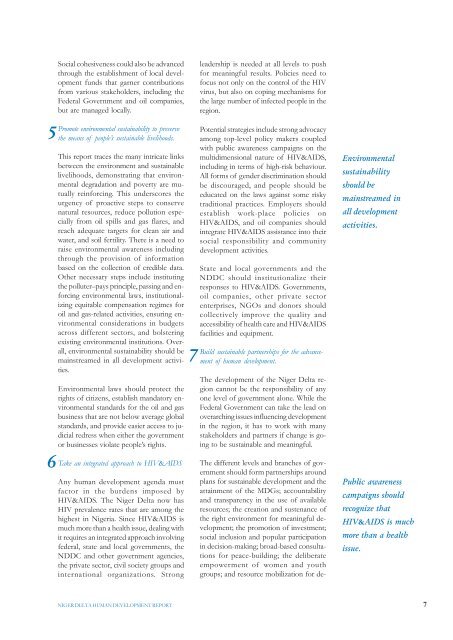Niger Delta Human Development Report - UNDP Nigeria - United ...
Niger Delta Human Development Report - UNDP Nigeria - United ...
Niger Delta Human Development Report - UNDP Nigeria - United ...
You also want an ePaper? Increase the reach of your titles
YUMPU automatically turns print PDFs into web optimized ePapers that Google loves.
5<br />
6<br />
Social cohesiveness could also be advanced<br />
through the establishment of local development<br />
funds that garner contributions<br />
from various stakeholders, including the<br />
Federal Government and oil companies,<br />
but are managed locally.<br />
Promote environmental sustainability to preserve<br />
the means of people’s sustainable livelihoods.<br />
This report traces the many intricate links<br />
between the environment and sustainable<br />
livelihoods, demonstrating that environmental<br />
degradation and poverty are mutually<br />
reinforcing. This underscores the<br />
urgency of proactive steps to conserve<br />
natural resources, reduce pollution especially<br />
from oil spills and gas flares, and<br />
reach adequate targets for clean air and<br />
water, and soil fertility. There is a need to<br />
raise environmental awareness including<br />
through the provision of information<br />
based on the collection of credible data.<br />
Other necessary steps include instituting<br />
the polluter–pays principle, passing and enforcing<br />
environmental laws, institutionalizing<br />
equitable compensation regimes for<br />
oil and gas-related activities, ensuring environmental<br />
considerations in budgets<br />
across different sectors, and bolstering<br />
existing environmental institutions. Overall,<br />
environmental sustainability should be<br />
mainstreamed in all development activities.<br />
Environmental laws should protect the<br />
rights of citizens, establish mandatory environmental<br />
standards for the oil and gas<br />
business that are not below average global<br />
standards, and provide easier access to judicial<br />
redress when either the government<br />
or businesses violate people’s rights.<br />
Take an integrated approach to HIV&AIDS<br />
Any human development agenda must<br />
factor in the burdens imposed by<br />
HIV&AIDS. The <strong>Niger</strong> <strong>Delta</strong> now has<br />
HIV prevalence rates that are among the<br />
highest in <strong>Niger</strong>ia. Since HIV&AIDS is<br />
much more than a health issue, dealing with<br />
it requires an integrated approach involving<br />
federal, state and local governments, the<br />
NDDC and other government agencies,<br />
the private sector, civil society groups and<br />
international organizations. Strong<br />
7<br />
leadership is needed at all levels to push<br />
for meaningful results. Policies need to<br />
focus not only on the control of the HIV<br />
virus, but also on coping mechanisms for<br />
the large number of infected people in the<br />
region.<br />
Potential strategies include strong advocacy<br />
among top-level policy makers coupled<br />
with public awareness campaigns on the<br />
multidimensional nature of HIV&AIDS,<br />
including in terms of high-risk behaviour.<br />
All forms of gender discrimination should<br />
be discouraged, and people should be<br />
educated on the laws against some risky<br />
traditional practices. Employers should<br />
establish work-place policies on<br />
HIV&AIDS, and oil companies should<br />
integrate HIV&AIDS assistance into their<br />
social responsibility and community<br />
development activities.<br />
State and local governments and the<br />
NDDC should institutionalize their<br />
responses to HIV&AIDS. Governments,<br />
oil companies, other private sector<br />
enterprises, NGOs and donors should<br />
collectively improve the quality and<br />
accessibility of health care and HIV&AIDS<br />
facilities and equipment.<br />
Build sustainable partnerships for the advancement<br />
of human development.<br />
The development of the <strong>Niger</strong> <strong>Delta</strong> region<br />
cannot be the responsibility of any<br />
one level of government alone. While the<br />
Federal Government can take the lead on<br />
overarching issues influencing development<br />
in the region, it has to work with many<br />
stakeholders and partners if change is going<br />
to be sustainable and meaningful.<br />
The different levels and branches of government<br />
should form partnerships around<br />
plans for sustainable development and the<br />
attainment of the MDGs; accountability<br />
and transparency in the use of available<br />
resources; the creation and sustenance of<br />
the right environment for meaningful development;<br />
the promotion of investment;<br />
social inclusion and popular participation<br />
in decision-making; broad-based consultations<br />
for peace-building; the deliberate<br />
empowerment of women and youth<br />
groups; and resource mobilization for de-<br />
Environmental<br />
sustainability<br />
should be<br />
mainstreamed in<br />
all development<br />
activities.<br />
Public awareness<br />
campaigns should<br />
recognize that<br />
HIV&AIDS is much<br />
more than a health<br />
issue.<br />
NIGER DELTA HUMAN DEVELOPMENT REPORT 7










